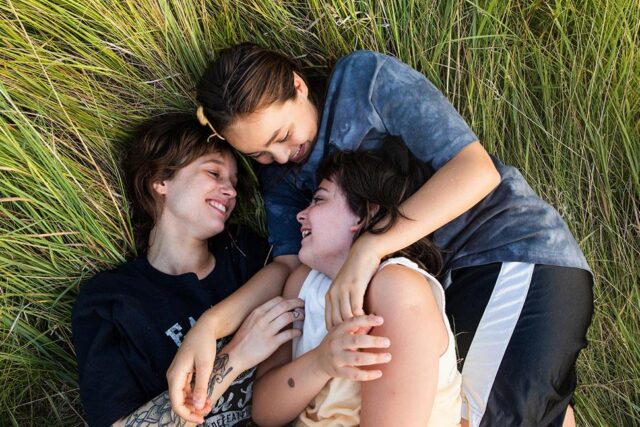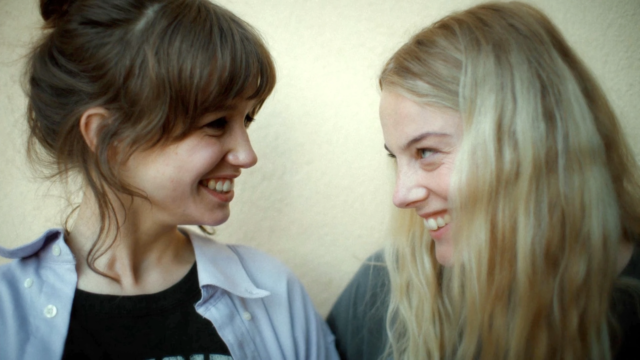
Three sisters come of age in one summer in Mika Gustafson’s Paradise Is Burning
PARADISE IS BURNING (Mika Gustafson, 2023)
IFC Center
323 Sixth Ave. at West Third St.
August 22-29
www.ifccenter.com
www.roomeightfilms.com
“I will never disappear / For forever, I’ll be here,” Swedish electropop musician and composer Fever Ray sings in their 2009 song “Keep the Streets Empty for Me.” The tune plays a key role in Swedish filmmaker Mika Gustafson’s heart-wrenching debut feature, Paradise Is Burning.
In a working-class Swedish suburb, sixteen-year-old Laura (Bianca Delbravo) is doing everything she can to keep her and her two sisters, twelve-year-old Mira (Dilvin Asaad) and seven-year-old Steffi (Safira Mossberg), together despite an absent father and a mother who disappears for long periods of time. When social services schedules a visit, Laura is worried that the three girls, who are very close, will be separated and put into foster care. Laura seeks help from her aunt Vera (Andrea Edwards) and their neighbors, Sasha (Mitja Siren) and Zara (Marta Oldenburg), an older couple who run a karaoke bar, but there’s not much they can do; Laura is on her own to preserve her family.
It’s summer, so school is not an issue. Laura comes up with elaborate plans to steal groceries from the supermarket. She avoids social services’ phone calls. She gives her sisters plenty of room to roam but fiercely protects and defends them if there are any problems. All three are going through major life events. When Mira gets her period, a group of friends hold a dramatic ritual celebration. Steffi is waiting for her first baby tooth to fall out. As Mira grows friendly with Sasha, “managing” his karaoke singing aspirations, Steffi collects stray dogs and meets Micai (Ellie Ghanati), another disaffected youth; they set up a unique little outdoor “home” where they can both let their rage out and find peace and privacy.
Laura enjoys breaking into other people’s houses and pretending to live like they do, eating their food, swimming in their pools, and trying on their clothes. She never takes anything from them; instead, she finds a kind of freedom, tinged with danger. In one house, she watches bullfighting on television; she is both matador and charging animal. Meanwhile, Andrei Tarkovsky’s Stalker is on in their own home, a film about a journey into a mysterious forbidden Zone where it is believed that people can achieve their most inner desires.
Running away after being chased out by the angry owner of a house and looking lost, she bumps into Hanna (Ida Engvoll), a thirtysomething woman who is instantly intrigued by Laura. The two quickly grow close; Hanna joins Laura on her fantasy adventures into houses, becoming friend, confidant, and maybe more. Hanna is a kind of mother figure — the type of parent Laura wishes she had — before the teenager finds out more about Hanna and her quest for freedom.
It’s no mere coincidence that the title, Paradise Is Burning, evokes Jennie Livingston’s award-winning 1990 documentary, Paris Is Burning, about BIPOC/LGBTQIA+ ball culture in New York City, where anyone and everyone can feel safe and secure being whoever they are and whoever they want to be. In nearly every scene, Laura looks like she’s ready to explode, to break free of the life she has been forced into. The sacrifices she must make are too much for any teenager to be asked to do. In one telling moment, she brings home T-shirts for her and Mira; Mira initially chooses the one with an eagle on it, but when she sees Laura put on the other one, with wolves, she asks to switch, which Laura does without complaint. Mira, who also thinks she’s ready for her mother’s fancy white high heels, aspires to be more like her older sister, who she considers tough and strong, not acknowledging that Laura is just a kid too, one whose ability to soar is being suppressed. In fact, animals figure prominently throughout the film, from rats and dogs to a Botero-like cat and three white flamingos hiding their heads in the water, emphasizing the wild nature of the sisters’ less-than-standard domestic existence.

Laura (Bianca Delbravo) finds an unexpected new friend in Hanna (Ida Engvoll) in Paradise Is Burning
In her first film, Delbravo is absolutely brilliant as Laura — she was discovered six years before shooting by Gustafson’s cowriter, Alexander Öhrstrand (who also has a small but key part in the movie), when he overheard Delbravo screaming at someone over the phone. With her pouty lips, puppy-dog eyes, and button nose, she’s a mesmerizing figure, a young woman trapped between being a child and an adult, best exemplified by subtle changes she makes in her movement and mannerisms when Laura is with her sisters as opposed to when she is with Hanna — superbly portrayed by Engvoll — who is also caught between two worlds.
Named Best Director and Best Screenwriter (with Öhrstrand) at the 2023 Venice Orizzonti, Gustafson exhibits an impressive talent in her first full-length narrative film; she previously made such works as the short Mephobia and the documentary Silvana. Her grasp of character development packs an emotional punch, as does the tempting sense of freedom lurking just around each corner for every character, reminiscent of Hirokazu Kore-eda’s Nobody Knows and Andrea Arnold’s American Honey and Fish Tank, while injecting a bit of David Lynch into the karaoke scenes.
“There’s no room for innocence,” Fever Ray also sings in “Keep the Streets Empty for Me.” Both Gustafson and Delbravo bravely navigate innocence and experience in their feature cinematic debuts, marking them as two to watch.
Paradise Is Burning opens this weekend at the IFC Center, with Gustafson participating in Q&As at the 7:00 sneak-peek screening on August 22 and the 7:15 shows on August 23 and 24.
[Mark Rifkin is a Brooklyn-born, Manhattan-based writer and editor; you can follow him on Substack here.]